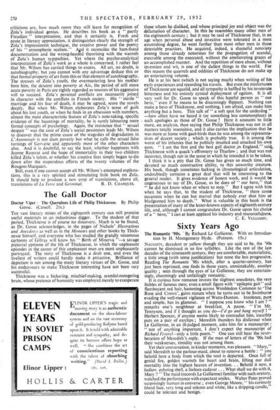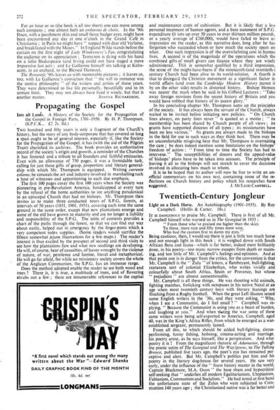Sixty Years Ago
The Romantic '90s. "By Richard Le Gallienne. With an Introduc- tion by H. Montgomery Hyde. (Putnam. 15s.) NAUGHTY, decadent or yellow though they are said to be, the '90s cannot be dismissed in so few syllables. Like the rest of the late decades of the nineteenth century, they are comfortable, materialistic, a little smug (with some justification) but none the less progressive. Reading The Romantic '90s which, after a quarter-century, has just been reprinted, one finds in those years, unmistakably, another quality ; seen through the eyes of Le Gallienne, they are entertain- ingly, charmingly and unfailingly romantic.
It is curious how romance invests the slightest anecdotes, the very foibles of famous men; even a small figure with "epileptic gait" and flamboyant red hair, hastening across Wimbledon Common to 'The Rose and Crown', gains stature when he turns out to be Swinburne evading the well-meant vigilance of Watts-Dunton. Insolence, pure and simple, has its glamour. "I suppose you know who I am ? " remarks one's neighbour at breakfast. A pause. "I'm Mr. Tennyson, and if I thought as you do—I'd go and hang myself !" Herbert Spencer, if anyone seems likely to contradict him, irascibly puts on a pair of earclips ; Meredith thunders his disfavour when Le Gallienne, in an ill-judged moment, asks him for a manuscript : "not of anything important, I don't expect the manuscript of Richard Feverel—only a little poem." One can still hear the rever- beration of Meredith's reply. If the man of letters of the '90s had their weaknesses, timidity was not among them. Yet their conversation, in kinder moments, was pleasant. "Mary," said Meredith to the parlour-maid, about to remove a bottle : " you behold here a body from which the soul is departed. Once full of genial fire, golden warmth for heart and brain, lifting our dull mortality into the highest heaven of invention. . . Behold it now, a hollow, echoing shell, a forlorn cadaver .. . What shall we do with it, Mary ? "The maid (records Le Gallienne) familiar with such oratory, watched the performance with expectant smiles. Walter Pater proved surprisingly human in converse ; even George Moore," his curiously blond face, very long and solemn and white, like a dripping candle," could be tolerant and benign. - For an hour or so (the book is all too short) one can move among such company ; one almost feels an embarras de choix. In the '90s Ibsen, with a parchment skin and small fierce badger eyes, might have been encountered any day at one o'clock in the Grand Café in Christiania ; in Paris we might have" supped with dear old Verlaine, and breakfasted with the Muses." In England Wilde stands before the curtain on the first night of Lady Windermere's Fan, congratulating the audience on its appreciation ; Tennyson is dying with his hand on a folio Shakespeare (and Irving could not have staged a more itnpressive last act) ; and Le Gallienne himself sits talking at Kelm- scott, in an orchard, to the Blessed Damozel.
The Roman fic '90s leaves us with memorable pictures ; it leaves us, too, with Le Gallienne's conviction that " the will to romance was the motive philosophy " of the writers and artists of those years. They were determined to live life personally, beautifully and to its utmost limit. They may not always have lived it wisely, but that is



































 Previous page
Previous page